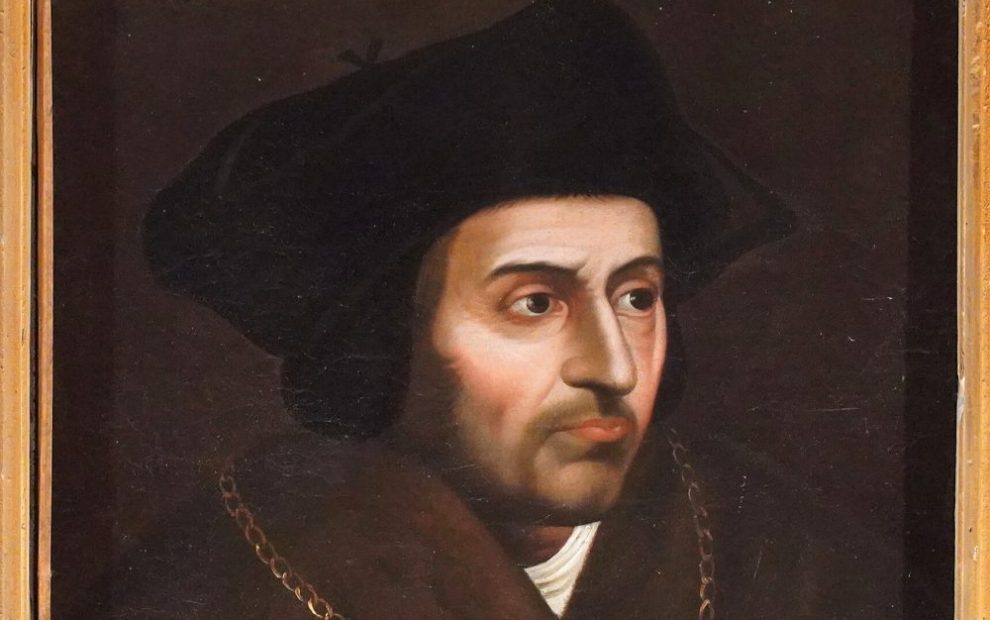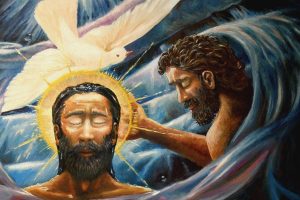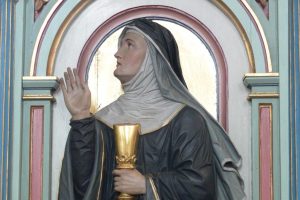On July 6, 1535, Sir Thomas More climbed a rickety scaffold to his death. He had believed his friendship with King Henry VIII would protect him from the political dangers of his day. It had not.
“I die the King’s good servant,” he declared before the blade fell, “but God’s first.” In that paradox between loyalty and resistance, More left a challenge for every age: How do we reconcile God’s call with the world’s demands?
Today, as public life once again tests the boundaries between faith, conscience, and political power, his story is particularly relevant. More’s life reminds us how easily power corrupts—and how costly it can be to take a stand rooted in both faith and integrity. Five hundred years after he knelt before his executioner, his voice still asks us to consider: How does God call us to serve the kingdom of heaven in a realm that has forsaken justice?
A dangerous friendship
More was a devout Catholic, but he was no religious zealot. Nor was he a political revolutionary. When the king made him the lord chancellor, both men assumed he would keep his head down and make no waves. A scholar, a lawyer, and a devoted father, More loved his family, his library, his garden, and his life. He had no wish to die for politics.
More and Henry’s years of friendship were based on their shared interests in theology and astrology, but as Henry’s ego grew, he craved flattery more than honest conversation. When the king gave his old friend the title of lord chancellor, More tried to serve quietly, improving public sanitation and defending the church against dissidents. He didn’t realize his loyalty to the church would ultimately lead to his downfall.
Meanwhile, Henry wanted only “yes-men,” people who stroked his ego and assured him his way was always best. He loved to strut and pose; he adored luxury of all sorts; and he saw women as chiefly put on earth for his pleasure. God had chosen him, he believed, to be the one and only divine representative on Earth, and his public policy was the thinnest of disguises for his personal desires.
In More’s book Utopia, written 13 years before he became lord chancellor, he asks a fictional king: “Why do you suppose they made you king in the first place?” More then offers this answer: “Not for your benefit, but for theirs. They meant you to devote your energies to making their lives more comfortable, and protecting them from injustice. So your job is to see that they’re all right, not that you are.”
Of course More could never speak these words to the real king of England! Instead, for years, More seems to have believed he could keep his inner convictions intact while outwardly going along with Henry.
More’s convictions
Utopia reveals what More truly believed about government. It imagines a commonwealth where no one lives in poverty, property serves the common good, and public officials are chosen for their virtue rather than anything else. “What justice is this,” one of the characters demands, “to give death to those who steal bread, while you allow the rich to hoard what would have kept the poor alive?”
More saw that sin could be systemic—that greed, enshrined in law, destroys community. He refused to accept that “being tough on crime” creates a safer society, and instead, blamed the society itself for allowing some children to grow up without the resources and opportunities available to other classes. “In other words,” a character in Utopia concludes, “you create thieves, and then punish them for stealing.”
Utopia goes on to point out that the wealthy of More’s day live in “great luxury and splendour,” and yet they produce next to nothing that benefits the larger community. Meanwhile, ordinary laborers—those who are “employed in labours so necessary, that no commonwealth could hold out a year without them”—lead “miserable” lives of suffering, want, and oppression. “Everywhere, in fact, there is a conspiracy of the rich, who are busy looking after their own interests under the name of the commonwealth.”
According to More, a true commonwealth—where wealth is shared in common—is a society based on cooperation rather than competition, where everyone seeks the good of the community rather than their own individual gain. In Utopia, strong social institutions override human selfishness, and the law upholds and safeguards these institutions. “Personal prejudice and financial greed are the two great evils that threaten courts of law,” More warned, “and once they get the upper hand, they immediately hamstring society by destroying all justice.”
How did More justify the sharp contrast between his personal convictions and the reality of King Henry’s realm? Perhaps, like many public servants today, he believed that conscience itself required loyalty to lawful authority. In Utopia, for example, he wrote that capital punishment is always immoral—and yet as lord chancellor, he participated in sending hundreds of people to their death, including people whose only crime was disagreeing with the Catholic Church.
Eventually, though, More could no longer go along with king’s ever louder and brasher demands. When the English clergy submitted to Henry’s ruling that all church law required his approval, More had enough. He resigned as lord chancellor and retired from public life.
When silence speaks
More hoped to retreat into silence—“I do nobody harm, I say none harm, I think none harm,” he insisted—but it was too late. “The devil cannot endure to be mocked,” wrote More—and now he had, in effect, thumbed his nose at the king. Henry’s response was all too predictable: He had More arrested and imprisoned in the Tower of England.
In the Tower, More had time to think. As he abandoned any hope of saving himself from the king’s wrath, he came to terms with his real beliefs. I suspect he may even have been relieved to simply give up the stress of pretending and posturing—and let himself drop into God’s eternal care. “The clearness of my conscience has made my heart hop for joy,” he told his daughter Margaret.
He used the 14-some months he spent in the Tower to read, pray, and write. He did not complain or feel sorry for himself; instead, his letters to his daughter are full of affection, little jokes, and a constant affirmation of divine joy and care. He had finally realized that freedom lies within, and he urged Margaret not to grieve. “Nothing can come but what God wills, and I am very sure that whatever that be, however bad it may seem, it shall indeed be the best.”
Having seen what happens when rulers demand worship and truth bends to power, he learned that only integrity—living in alignment with divine love—brings real freedom. He knew now that laughter, learning, faith, and even love itself can be forms of resistance.
During his time in the Tower, he wrote a book, Dialogue of Comfort Against Tribulation, a series of conversations between young Vincent and his older uncle, Antony. Vincent is anxious about the world’s current state of affairs, especially the threat of foreign invasion and what that could do to his finances. His uncle’s answers are both humorous and challenging; he reminds Vincent of what Jesus said about wealth (Matt. 6:19–21).
I hardly think we need any more advice, or any further consolation for the loss of our goods to the persecuting Turk. Our Lord tells us where our treasure will be secure: in the hands of the poor . . . . When we give to the poor, we give to Christ himself.
When we make others’ needs our priority, More concludes, our perspectives shift. With our resources safe now with Christ, we are freed to think and act differently toward others.
In many ways, the two characters in the book, Vincent and Antony, represent More’s two sides: Vincent is fearful, willing to compromise his convictions to protect his physical safety; Antony is wise, calm, convinced that true faith—supported by the divine joy that breathes through prayer—always reveals itself as societal justice.
Only with fervent prayer and unceasing hard work, said More, can we align our actions with our deepest convictions. Before he died, he wrote in the margins of his prayer book: “The things, good Lord, I pray for, give me the grace to labour for.”
A difficult saint
In 1935, 400 years after More’s death, Pope Pius XI canonized him as a saint; he was later declared the patron saint of lawyers and statesmen.
As I’ve researched More’s story and gotten to know him a bit, I have mixed feelings. He was witty, cultured, and always deeply spiritual—yet for much of his life, he was capable of cowardice and hypocrisy. He insisted that his daughters be educated and took pride in their intelligence—yet he had little if any tolerance for religious dissent. His conscience was far more bothered by the legal controversies between church and state than it was the deaths of Protestants burned at the stake. Sadly, like all human beings, he was far from perfect.
It would be easy to dismiss him as a historical footnote to the larger, more dramatic story of Henry VIII. From a temporal perspective, he did very little for the realm of heaven. He was no Teresa of Ávila, burning with passion for Christ; no Francis of Assisi, overflowing with love for all creation; no Ignatius of Loyola, starting an order of brothers that still influences the world. Mostly, he simply survived—for a time—in a world where power demanded adoration, truth was reduced to loyalty tests, and too many people used faith as a justification for cruelty.
More was self-aware enough to know how often he’d failed to rise to the challenges of his day. He recognized himself in the gospel stories of Peter’s faltering faith—but he also took comfort knowing Peter was ultimately forgiven and lifted up. Despite all More’s failures, he told Margaret, “Christ will not let me be lost. I shall, therefore, with good hope commit myself wholly to him.”
From that hard-won place of confidence, More continues to challenge us. Holiness, he affirmed, belongs in public life. Prayer and politics, justice and joy are not enemies but partners. He reminds us that citizens who prize convenience over conscience—as he did for much of his life—are as responsible for the world’s injustice as our leaders are. “If we suffer our rulers to be wicked,” he wrote, “we make ourselves their accomplices.”
His life offers no easy answers. It does, however, leave us a question worth pondering: How might conscience reshape the world we build today?
Across the centuries, comes More’s reply: If you would build a better world, you must work as hard as you pray.
Image: Wikimedia Commons













Add comment